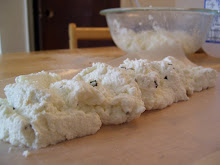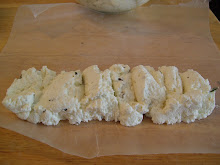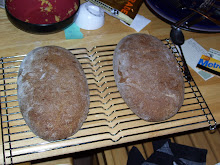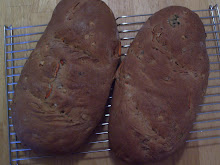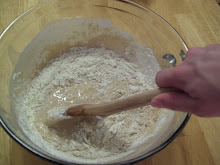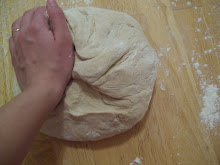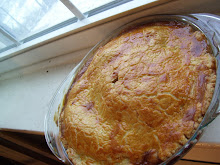I absolutely love food in all of its glory of foodiness. Food is much more than what we as humans subsist on. It is a thing of process, skill, tradition, slowness, and community and all of these elements are inextricably linked and dependent on each other. If one is missing than the food itself suffers in a way that is indicative of how the smaller community of food makers and eaters suffer. I find it interesting that something so simple indicates the vitality of a micro-society; extraordinary considering the temporariness of meals and primarily base purpose of food to nourish mortals. Yet the simplicity of food and its foundation in our daily practices as a society seem to transcend its base beginnings. Food can be a mode of expression and even a block thrown into the cogs, halting the wheel of our daily routines. It is central to most holidays and religious ceremonies in either the eating, fasting, or sacrificing of food. It symbolizes something potent, in both a spiritual and earthly way. It is of the flesh, yet so many ancient monastic orders produced the finest of meat, cheese, baked goods, beer, wine, and chocolate.
I feel in a simple way food expresses many transcendent ideas in a very accessible and necessary way. I do not find it surprising that many contemplative communities build their life around the physical tasks of growing and preparing food, and performing other tasks of physical labor and service. Tasks such as these often include a process through time, some amount of skill and knowledge, repetition, and an eventual result. You begin the assigned task with little knowledge or experience, thus learning through the help of others and the inevitability of mistakes. The task requires you to perform it through its own process and time. Something such as gardening or cooking has its own rhythm and timing which will not be rushed or work according to the convenience of the cook or gardener. All work related to food includes some amount of repetition: sowing seeds, weeding, harvesting, chopping, kneading dough, stirring soup are all very repetitive, a sort of rhythm to the repeated movements of the body. Eventually, the process will lead to a material result. With this finished product at hand and ready to enjoy one can reap from it the joy of a completed task, something that can be enjoyed and shared with others, and something that can be improved the next time round. All these steps are rife with lessons of humility, patience, sharing, understanding, service, love, dedication, sacrifice, etc. It is indeed no wonder that the contemplatives have sought this sort of life style for ages. However, such tasks and processes are not isolated to contemplative communities. They are readily available to the daily lives of all families. However as a society we have rejected this life style as full of tedium and drudgery. For years and years we have sought out the advancements of industry and technology to escape this life of endless work. First men, then women abandoned the work of the home for the larger economy. The field and kitchen are no longer recognizable. They have been replaced with lawns and microwaves.
But I have to ask, what have we sacrificed? The struggle of working has now taken the place of the struggle of living. We now spend endless capital on an education meant to attain a particular position in a field of work. The work is specialized, compartmentalized, and stagnant. A job title often has more to do with your placement in the chain of hierarchy and paperwork than with the actual tasks you perform at work. Most of work is taken up by machines: photocopiers, phones, and computers. No matter what your position is, you sit behind one and answer to it. The organization you work for could even be related to something you are truly passionate about, but the work itself is often boring and mindless, yet endless and therefore stressful. In the midst of boredom, hierarchy, and anxiety it is no wonder these hurried and harried people become addicted to Starbucks coffee, curse out fellow drivers with their windows rolled up, need weekly yoga, and Friday purchases of the “I deserve this” treats all to feel better and enjoy the two day weekend. In the midst of this hullabaloo we have lost time spent within the home, spent with our family and friends. We have also lost track of work done for the household. As a result of this modern work-obsessed society, the living room has become a mega-entertainment center and the kitchen a row of plastic electric-powered tools that allow you to simply move the food from one machine to the others, the shortest and most popular route often being from the freezer to the microwave. This type of mono-typed, tedious lifestyle has replaced the lifestyle of working to keep house.
I have to say, I don’t think it’s worth it. I would rather work more for my daily survival. I do not want to have to work some dead end career in order to buy a weekly supply of frozen and packaged dinners for my family. People often refer to receiving a pay check as “putting bread on the table.” I feel this must refer to taking your pay check and purchasing a bag of sliced bread, Wonderbread or whatever else happens to be on sale. I would rather use flour, water, and yeast and make my own loaf of bread from scratch. I would rather work at a “workplace” less, have more time at home, or, if I can afford it, not work at all. I opt for a different kind of life. I want to work in a different way.
It is not that I am rejecting work; I simply refuse to work in the current context and systemized way that we think of work in this industrial, capitalist society. Working with my hands is something that I not only do not mind, but greatly prefer. I love being active, using my body to create, whether I be growing and cooking food, writing, knitting, or building or repairing something – I love putting my hands to work. But, it is not simply that I enjoy doing these things, I actually feel it is important that everyone somehow participate in the things that make their lives possible. I feel it is important to participate in your food, your home, your mode of transportation, etc. Whatever makes your life possible, I think it is our duty to participate in those things. Whether they be things of basic survival or hobbies, it is important to understand the actual composition of our lives. This kind of work has been classified by our own current society and by classical philosophers alike as the calling for those of lesser status and intelligence. But, is this a truly accurate classification? If the brains are being relegated to other areas of work, then what is happening to our food and other basic systems of living? If buildings are being built and farms be farmed and food being prepared by those without the ability to critically think, creatively problem solve, and contextualize actions within a wider environment then not only does the quality of the work suffer, but so does the entire functioning of the society. If the very foundational basics of life are in some way poorly made or made without understanding the consequences of particular actions then it is possible that those foundational elements will fail, providing a poor beginning for any further functioning or advancement of the society. In a similar manner, if this kind of work is not recognized as work that should be valued, both socially and economically, then the work will mirror that lack of value. Also, it goes without saying, but is an important issue to bring forth, that individuals of status and intelligence have indeed opted to pursue work that is more intimately related to our survival. This decision may have been met with disappointment or surprise from family, friends, teachers, and professionals. However, I hear more often of those that leave the modern “workplace” to begin a life as a farmer, cook, homemaker, or other endeavor. Indeed, there are some people who even take vacations from the “workplace” to work for a few weeks on a farm, to connect with the skills and work that more intimately tie us to our survival.
What is it about the work of the home, the garden, the kitchen that is so satisfying (I do not mean to exclude other vocations that tie us to our survival, there are so many. There are apiarists, fishermen, butchers, blacksmiths, glassblowers, builders, and endless amounts of craftspeople and artisans that work in a more intimate manner with the raw material on which our lives are based). There is indeed a value in understanding how exactly we as humans survive. Our current modern lifestyle veils so much of the material that enables us to live behind a sort of iron curtain (pardon the misappropriation of the implications of this term). It’s not only that we don’t know where things come from (our food, our homes, etc), it’s that we don’t know how to make those things, or what those things really are (for example, ever tried interpreting the list of ingredients on your standard dinner out of a box). So there is a certain element of awareness, understanding, and acquisition of skill that comes from this kind of work. But this sort of learning provides us with something quite rich and complex. We become aware of where humans fit into the world, we begin to question where the tomatoes in the garden came from, we become grateful for the fruits of labor when we understand what exactly the labor is. And this is it, the base of where a more spiritual life can evolve. This is why I think many contemplatives followed and continue to pursue the work of the hands.
Many people seem interested in the movement for local, organic food as a signal that we are becoming eaters who actually care about what we are eating. I do think there is a little more awareness in how food is labeled. However, I can’t help but think our scope is limited to how food is labeled, not necessarily how it is actually made or what we do with it once it is home. Knowledge of the work that goes into making food, ex. tilling, water use, sustainability, basic procedure, etc. is largely unknown. Also the skills that are required in the kitchen are also being lost and without much effort to gain those skills back. Most cooking shows on the Food Network (Rachel Ray comes to mind with her Thirty Minute Meals) focus on making food fast, easy, and convenient. They are not teaching skills of preserving food, tending a kitchen garden, making basic ingredients at home (pasta, bread, cheese, yogurt, beer, wine, etc), or even how to make food using non-processed ingredients. The actual work of food, of making something truly homemade and cared for is lost to mechanization.
How can one enter into this sort of work of the hands within the current modern context? I do feel the trappings of our time do present some unique challenges, but I do believe it is possible. There are many small ways to participate in the work of the home: cooking from scratch, starting a kitchen garden (if you don’t have land, then apply for space at a community garden or volunteer at a local farm), make more, learn more. I myself am slowly entering this world and struggling to learn more skills, searching for opportunities to learn from others. The wonderful thing about this is the sense of community that grows from this journey. I have been taught to grow food and knit from people that have become very dear friends. Much of my cooking and baking has been self-taught, but has inspired in me a desire to share what I make with others. It has especially developed a reverence for the times of eating meals – the serving, sharing, community, conversation, and gratitude that blooms while gathered together eating is indeed something of life that I daresay is representative of the best that our life on earth can offer. This is what gives the true meaning to participating in the making of your food, that you are in some way contributing to the fellowship of a meal which may indeed be earthly and temporary, but in that eventual ending it indeed gathers its sweetness. Is it no wonder that families, religious communities, and contemplatives of all kinds gather for meals? Is this not in some small way a ceremony of religious, or at least spiritual import?
Well, this is what I have for now. I hope you have a good evening and, of course, a wonderful meal!
